Death stalks the halls of the Two Reel Cinema Club this episode, as we get stuck at the Popcorn Counter and kill time with a quiz about our favourite movie demises. How often do you hear Jeff Bridges, Stanley Kubrick and Public Enemy in the same show? Also, be prepared for plenty of dead air while our brains move at the speed of melted cheese. Plus one of us almost electrocutes themselves. Guess along with us, and place your bets on who will win or, more accurately, who will lose the least.
Mission: Impossible 2 (2000): Beachball Bingo
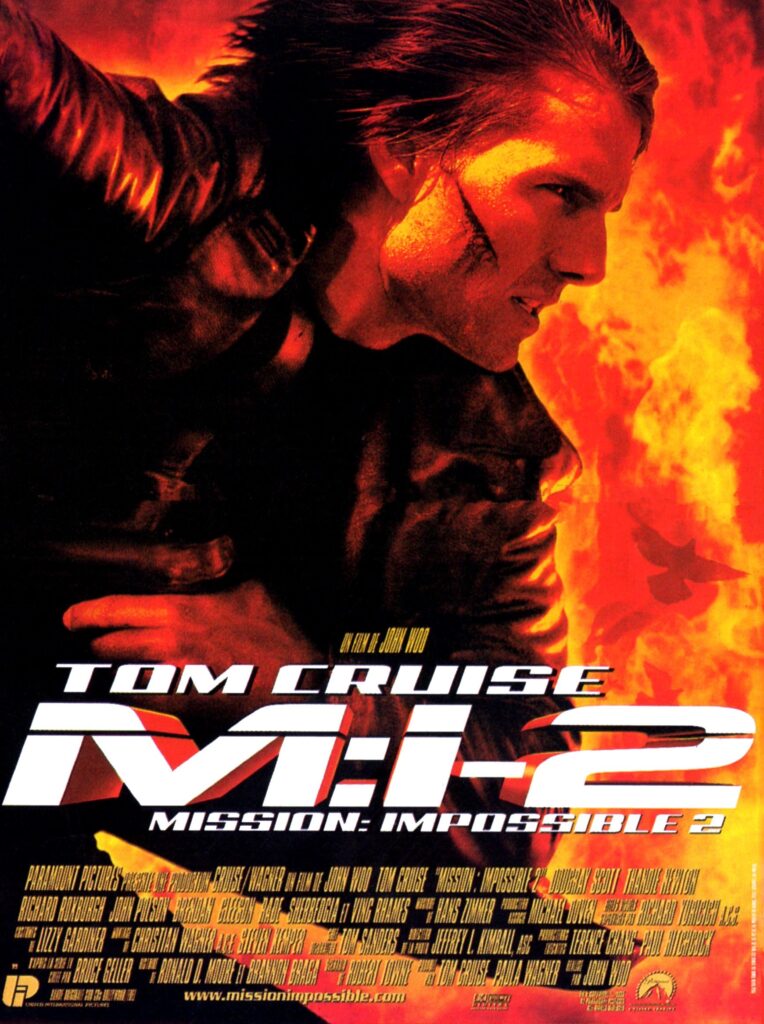
The Cruise-a-thon continues, with Mission Impossible 2, the John Woo-directed CinemaScope-explosion of action-idiocy.
I remember liking this film quite a lot when it first came out, but I spent the first half of this rewatch inwardly sneering at the ludicrousness of the story and the ridiculous, over the top melodrama of every scene. And then at about the midpoint, during the complicated lab break-in set-piece, I realised: oh yes, it’s SUPPOSED to be like this. That’s the whole idea. It’s a Hong Kong action film from top to toe.
Tom Cruise plays Chow Yun Fat, the greatest action hero of the 1990s. Thandie Newton plays a character called, I think, ‘Boobs’. And Dougray Scott plays a bad guy called Sean who ought to be called Scot Bad, as he is a bad guy and also he is a Scot. (Okay, perhaps ‘Scot Bad’ is a little too on the nose. But if you’d told me his name in the script was ‘Scot Badscott’ I would have believed you.) The plot about lab-made viruses and a pharmaceutical company’s plans to sell an antidote reads like the Facebook rant of an anti vax campaigner who ‘did their own research’. (In fact I suspect half-remembered fragments of Mission: Impossible 2 are responsible for more Covid conspiracy theories than Paramount would like to acknowledge…)
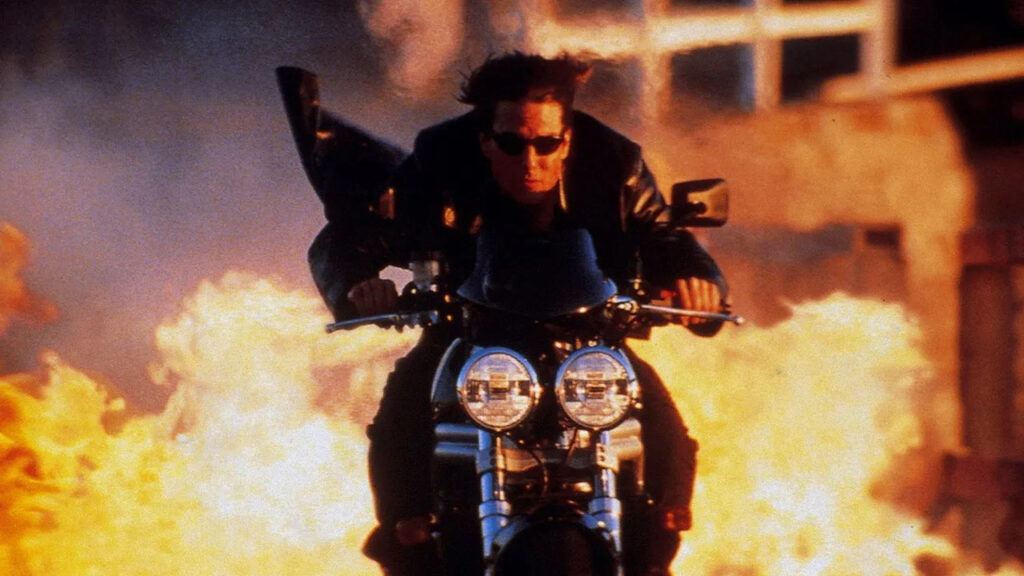
But the stunts and set pieces are tremendously entertaining once you let yourself settle into the crazy stupidity of it all. Absurd motorbike jousting, crazy back-flip-kick-box-fights, an evil lair full of bottles of inflammable liquid, it has them all. Get in. The film has made a conscious decision to tie up plausibility, gag it and throw it out of a helicopter over a waterfall. It’s murdered early on in the film and stays dead for the rest of the run time.
There are a few wrong notes, most notably the camera’s constant leering at Thandie Newton, staring at her chest or down her top at every opportunity. She’s largely treated as an object for the whole film, either a maguffin or a bargaining chip or a walking disease vector or just some boobs. Once again it’s a mild surprise to see what was considered perfectly acceptable just a few years ago.
And I was sure until this rewatch that there was a scene in the film that sees Tom take off a mask to reveal he is someone else, and then take off THAT mask to reveal he actually IS Tom after all. Disappointingly this scene never happens. No wonder I thought it did, though, as it would have fit the tone of the film perfectly. What a missed opportunity. I might pitch ‘Mission Impossible: Head Like a Beachball’ next time I get the chance…
Episode 45: The Menu vs Babette’s Feast: A Cinematic Smorgasbord
Man cannot live by popcorn alone (and God knows we’ve tried) so this episode sees us drinking deeply from the cup of culinary cinema. The Menu boasts a high concept story, a starry cast and a considerable body count, but is it a comedy or a horror movie? And how does it measure up against one of its primary influences, 1987’s beautiful Danish Oscar winner Babette’s Feast? The two form an incredible double bill that pits late stage capitalism against the foundations of liberal democracy, religion against sensuality, death against rebirth, champagne against Valpolicella, and turtle soup against some marshmallows, with bread on the side. Actually, no, there’s no bread. Can we get some bread here, please? No? Please? Plus a look at some new docs, a regrettable viewing of an 80s dud, a brand new sponsor and a revealing game of ‘Who Am I?’ Tuck in!
The One Scene Movie: Mission: Impossible (1996)
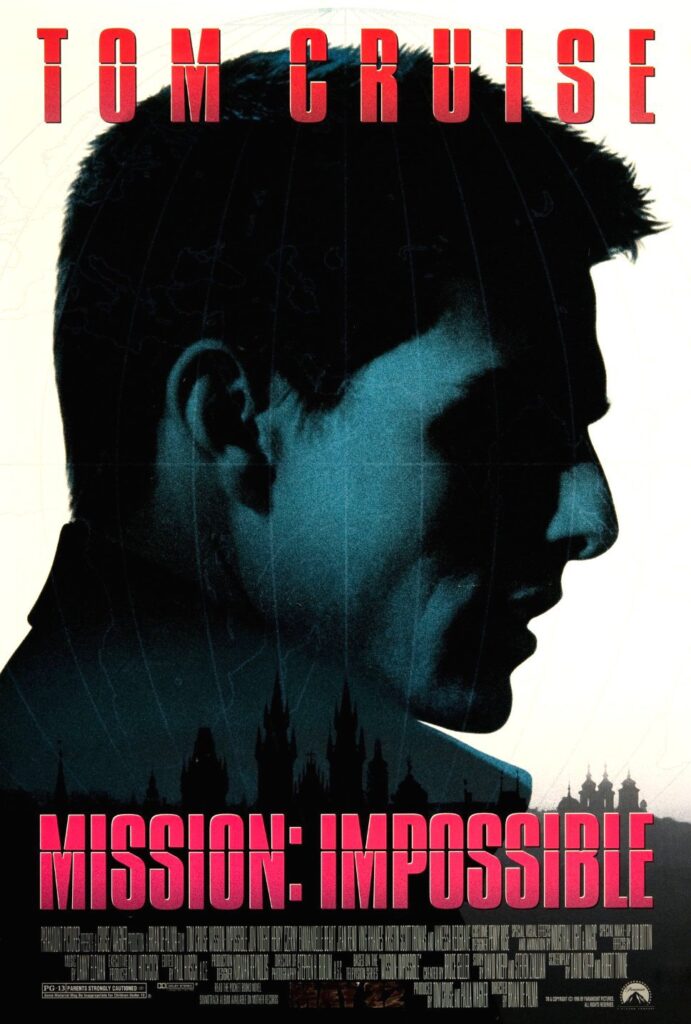
Welcome back to the Tom Cruise Cinema Club. I recently returned with the whole family to watch the Brian de Palma-helmed, curiously punctuated Mission: Impossible for the first time since seeing it on its theatrical release, and found a few surprises.
One: the internet. Wow, it’s easy to forget how recently the internet became omnipresent. 1996 doesn’t sound like very long ago, but the internet in this film is Triassic. Clunky big laptops. Such ostentatious use of ‘E-Mail’ it’s almost capitalised, with a little animation to illustrate a message being packaged up in an ‘envelope’ and ‘posted’. Tom even needs Usenet to contact the criminal underground. Usenet! Fantastic.
Two: there’s only one scene in the whole film. I know, that’s not exactly true, but there’s a reason why the overriding mental picture most people retain of the movie is Tom Cruise suspended in the air on a cable in a white vault. The film is built around a series of set pieces but the only one that really works is that CIA heist. Who can remember the others? Exploding chewing gum on a fish tank, a chase with a helicopter in a train tunnel, they’re all fine but they don’t stick in the memory like the highly contrived but entertaining ceiling-dangling-computer-hack. The film looks like that was the primary scene that anyone thought of and the rest of the picture was built around leading up to it or following the repercussions.
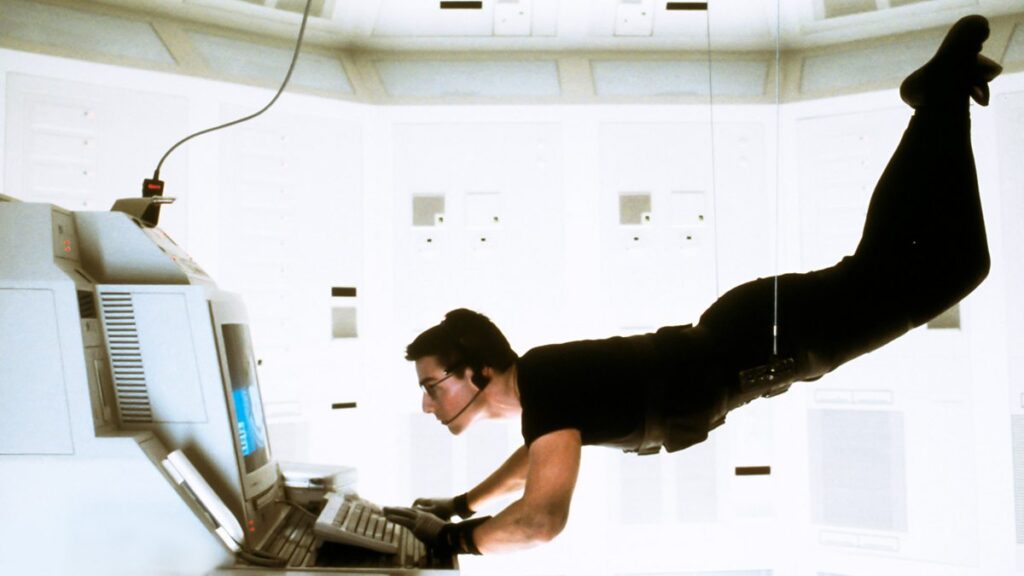
Three: that one scene is terrific. The stakes are clear, the obstacles obvious, the timing immaculate, the execution highly accomplished. De Palma is shooting his own mini Rififi here. There is very little dialogue because very little is needed. And because only a tiny amount of the plan has been explained beforehand there are plenty of surprises and reversals to maintain the tension. We cringed and held our breath and ooh’ed and ahh’ed as we watched, just like we should. Great fun.
So I guess the take home message is that you CAN build a multi-sequel, twenty-eight-year-spanning film series out of a single scene, as long as that scene is good enough. Maybe we writers should be putting more effort into single outstanding scenes and not worrying about the surrounding 110 minute stories after all…?
Episode 44: Popcorn Counter: Under the Sea
Ah, the water: clear, blue, enveloping. And also cold and airless and deadly. Do we have any favourite films set on or under the water? You bet we do. From Moana’s beautiful vistas to Jaqueline Bisset’s effect on an impressionable eight year old, we look back at half a lifetime at sea in the cinema. Plus we reveal the secret to successfully pitching an ocean-going picture, and contemplate the benefits of drowning in butter.
Oh Dear: Adventures in Babysitting (1987)
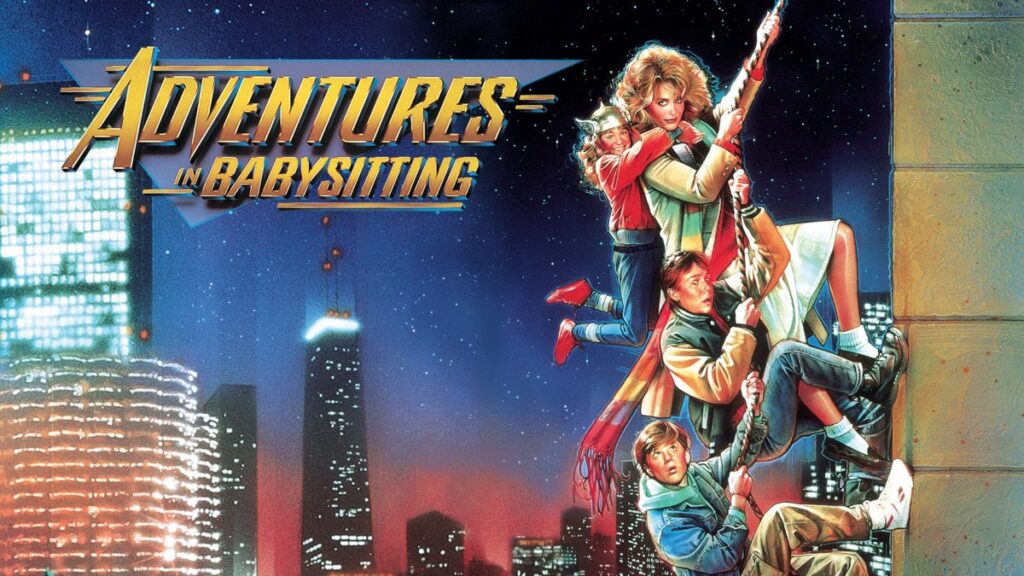
Okay. That’s it. I might just have to give up watching films from the 1980s. It’s a shame, but they’re just too damn weird.
I’d never seen 1987’s Adventures in Babysitting before this week. It’s the directing debut of Chris Columbus, and it’s true that the basic shape of the film is good. Elizabeth Shue is Chris, a seventeen year old baby sitter looking after an eight year old, until she gets a call from her best friend pleading to be picked up from the bus station in downtown Chicago. So the eight year old has to come along for the ride, and so do her 15 year old brother and his buddy. But then they burst a tyre on the way, and a cascade of bad luck sees them kidnapped by criminals, escaping and being pursued across the city. All good family fun. And to be fair, there were quite a few moments when I laughed out loud…
… but. Oooh but. The uncomplicated family fun stops pretty early in the film, pushed off screen by a long parade of weird sexual stuff and straightforward racism. Ah.
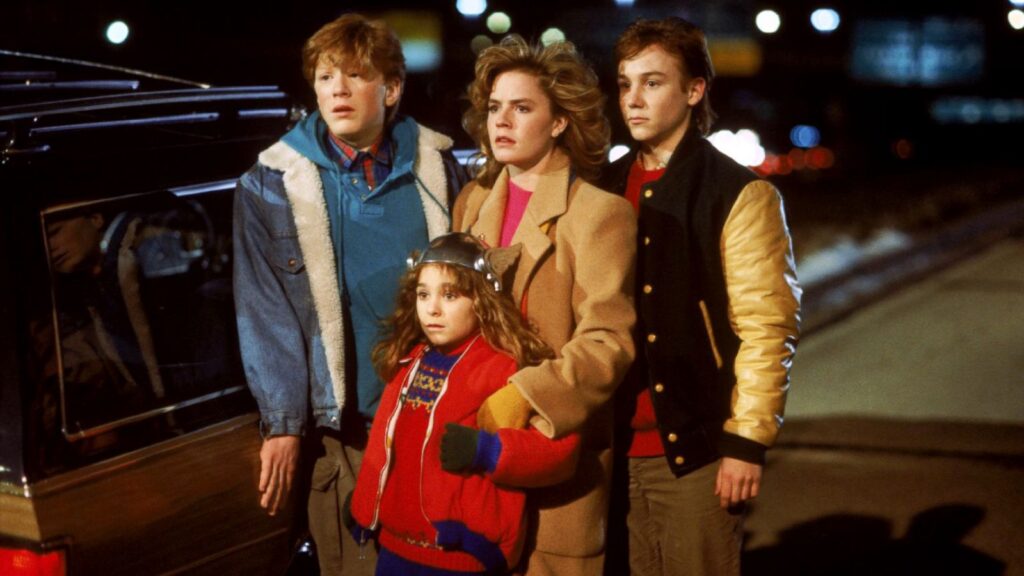
Playboy is all over this film, so omnipresent that it must surely have been a paid-for product placement. One of the boys has a copy of the magazine with him, and points out that the centrefold model looks like Chris; then the criminal masterminds have written notes on their car theft conspiracy all over another copy of the magazine, which one of the boys steals and hides in the eight year old’s backpack. They go to a frat house party, where one of the party goers has brought a copy of the magazine along (what?!) and tries to get Chris to autograph it; they go to a high class, fancy restaurant, which has a huge poster advertising Playboy right outside, making the doorman do a double take. It’s relentless. Who thought Playboy was an appropriate product placement for a family-ish comedy?! The 80s, that’s who.
The uncomfortable sex stuff doesn’t end there, either. What about the seventeen year old street walker played as a throwaway gag? Or the fifteen year old seducing an adult student at the frat party? Or Chris’ friend from the bus station being sexually assaulted in the car as she sleeps? Oh dear.
And you remember I mentioned the racism? Oof. People of colour in this film are there to be scary. That’s it. The kids get in a car to escape a shooting, only to find it’s being driven by a BLACK MAN!! Everyone screams. They run away from the bad guys, only to find themselves in a blues club where all the patrons are BLACK!! Oh my God!
Oh, and even people with disabilities are in the firing line, too, as the kindly tow-truck driver who picks them up has a hook shaped prosthetic hand that’s played for horror and/or laughs. That’s nice.
So I give up. I don’t remember the 80s being like this, but I think they were. We have proof. Might be better to back away now before anyone else gets hurt…
Episode 43: Avatar The Way of Water vs The Abyss: James Cameron Deep Dive
Avatar The Way of Water is dominating screens all over the world, closing in on two billion dollars at the box office as we record. But it’s not the first time James Cameron has been on a diving holiday – and we’re not talking about Titanic, either. 1989 sci-fi swimathon The Abyss was the superstar director’s first foray into the water (Piranha II doesn’t count), and although it flopped at the time, it has a great deal in common with his new, all conquering CGI epic. We submerge ourselves in the two films, and return to the surface with questions. Which film features 1960s dad? Which film relishes the darkness? And which of the two could really do with a few more jokes? Plus we play a new movie game and watch half of Glass Onion. Only half, mind you.
Episode 42: Film of the Year 2022
We’ve been doing this podcast for a whole year now, and we’ve seen some astonishing and remarkable movies. We’ve seen some dreadful clunkers, too. So join us for our inaugural award ceremony, celebrating the best of the best in six categories, while not forgetting the awful films, which get an award all of their own.
Episode 41: Popcorn Counter: Bah Humbug
There’s a whole channel of Christmas movies now, a whole channel! Why? This episode at the popcorn counter we ask how come there seems to be such a wealth of Christmas movies, but not nearly so many Easter movies or Thanksgiving movies or Harvest Festival movies. And seeing as there is such a glut, we single out some of our favourites to give you a bit of a guide to the best of Yuletide watching.
Episode 40: Your Christmas or Mine vs It’s a Wonderful Life: Festive Face-Off
It’s that time of year again, when Christmas movies come to our screens thick and fast. But do either of those adjectives describe the new Amazon original, UK-based, rom-com feature Your Christmas or Mine? And how does it compare to the eternal yuletide classic It’s a Wonderful Life? We examine both films in depth, including a look at the writing process and the challenges of creating a good ‘bottle episode’. Which film features Elon Musk in disguise? Which film has the Cliche Squad working overtime? And does the differing way these films discuss race and class suggest any social change in the last eighty years?
